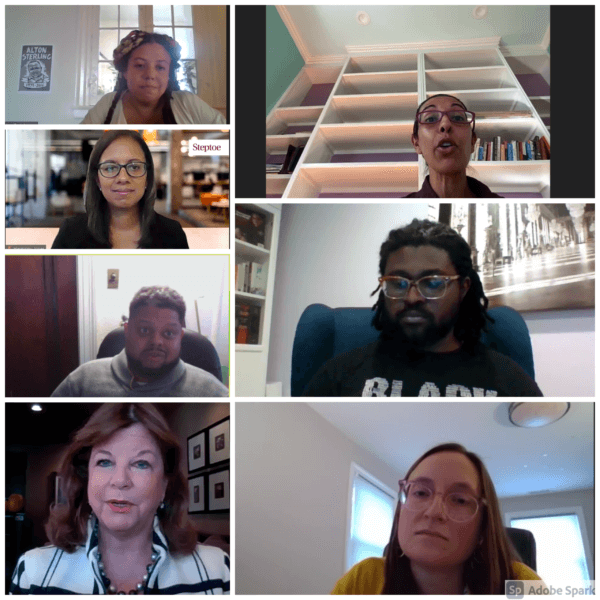
DC Pro Bono Week 2020: Advancing Racial Justice & Equity Through Pro Bono
By Heather Krick
On Thursday, October 29, 2020, Washington Council of Lawyers held an important discussion on Advancing Racial Justice and Equity Through Pro Bono. ABA President Patricia Lee Refo joined for opening remarks, noting the importance of the topic and thanking Washington Council of Lawyers more generally for participating in the 12th Annual Celebration of Pro Bono in Washington, D.C., and organizing numerous public events, trainings, and volunteer opportunities as part of DC Pro Bono Week. Harmony Jones, Deputy Pro Bono Counsel at Steptoe & Johnson LLP, emphasized the opportunity for lawyers to make a difference in racial justice and equity as she began to moderate the panel discussion.
“Sentences received for crimes do not include contracting Covid-19 and death.” – Joanna Perales
First, the audience heard remarks from Joanna Perales, a Research and Writing Attorney with the Federal Public Defender for The District of Columbia, and Ernest Boykin, a Compassionate Release Recipient whom Joanna represented. Joanna pointed out that “the sentences received for crimes do not include contracting Covid-19 and death.” When Joanna met her client, she began by learning about his lived experiences in lockdown, including the protocols for reducing health risks, such as the frequency of temperature checks. Joanna later included these details in her motions, quoting some of Ernest’s descriptions to bring his voice into the courtroom. Her candid discussions with her client helped her gain his trust and build rapport.
“Anybody can go to prison.” My advice to lawyers representing anyone is
to “[g]o in without any preconceived notions or prejudices.” – Ernest Boykin
Ernest Boykin shared with the audience that he was prepared to pay a $5,000 retainer to a D.C. lawyer with an impressive reputation before Joanna offered to work for him for free. He said he and Joanna immediately clicked from their first conversation. His advice for establishing trust with clients, especially Black and Brown clients, is to begin the relationship without any pre-conceived notions or racial biases and treat your client the same way you would treat a family member. Ernest emphasized the need for attorneys not to judge their incarcerated clients based on their sentences, as a disproportionately harsh sentence may not always reflect the character of the individual, but instead reveal unfortunate circumstances or other factors.
“If Louisiana were a country, it would have the highest incarceration rate in the world.” – Nora Ahmed
Next, the audience heard from Nora Ahmed, Legal Director of the ACLU of Louisiana. Nora spoke about a new project within the ACLU of Louisiana called Justice Lab: Putting Racist Policing on Trial, which addresses ongoing problems with local policing. Specifically, the project challenges racially discriminatory policing practices and combats police violence against people of color in Louisiana. The Justice Lab provides comprehensive training to law firm and law school clinic volunteers who work on cases that challenge unconstitutional stops, searches, seizures, and excessive force. Nora explained that there are less than a handful of cases with a statute of limitations of more than one year. The statute of limitations runs while clients are in jail from the police encounter. Thus, it is imperative to quickly respond to individual cases and simultaneously look for ways to create systemic change.
“Historically, those that make change are the folks on the ground.”
The goal for lawyers is “to open up space for those people who will make the change.” – Marques Banks
Then, the audience heard from Marques Banks, Associate Attorney with the Washington Lawyers’ Committee for Civil Rights and Urban Affairs and current volunteer with Law 4 Black Lives DC. Marques discussed a similar mission to Nora’s rooted in D.C. with Law 4 Black Lives DC, a volunteer-based organization that seeks to eradicate white supremacy and anti-Blackness. As a volunteer, Marques leverages his legal skills to provide criminal defense for arrested protesters. Protests and movement lawyering are important components of combatting racism and moving our society toward racial justice and equity.
“There has been more than a century of harm in Louisiana created by the Jim Crow law.” – Jamila Johnson
The audience also heard from Jamila Johnson, Managing Attorney for the Unanimous Jury Project (Jim Crow Juries) with The Promise of Justice Initiative in New Orleans, Louisiana. The project works with 1,600 prisoners who were convicted by a Jim Crow jury. The term “Jim Crow jury” describes a jury who convicted a defendant without a unanimous decision on the defendant’s guilt. When jurors’ votes are required to be kept secret, there is a possibility that the opinions of Black jurors may be silenced. This policy has made it seem easier to convict Black Louisianans when non-unanimous decisions are influenced by racial biases and juries are not diverse. In April, the United States Supreme Court found non-unanimous decisions unconstitutional. As a result, all prisoners affected by this decision have one year to file for post-conviction relief. In response, Jamila’s organization needs to file another 200 cases within the next two months to preserve the rights of those affected by this decision. The Unanimous Jury Project has video trainings available and will co-counsel with volunteers.
Heather Krick is the principle of Heather Krick, Attorney at Law and a member of our Communications Committee.






